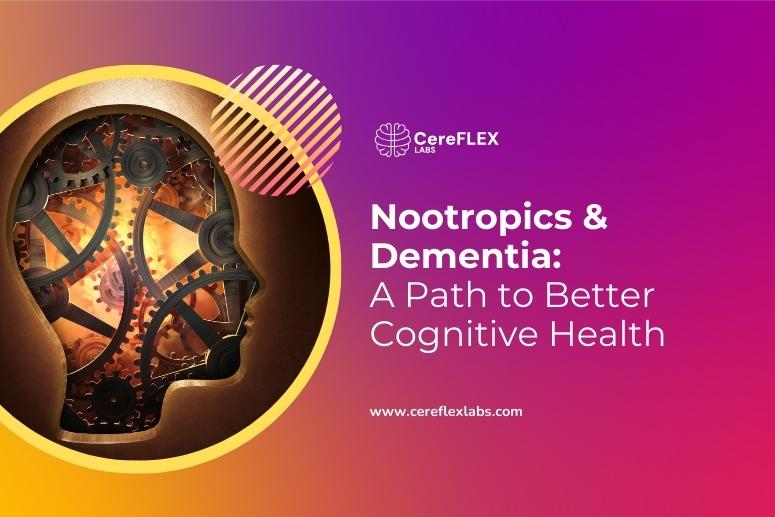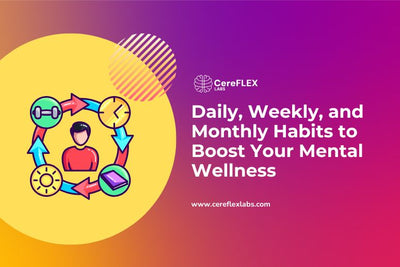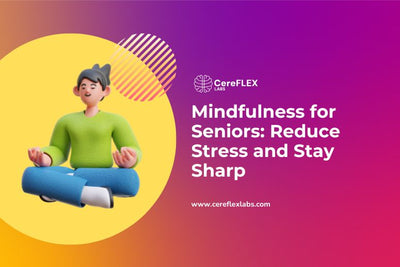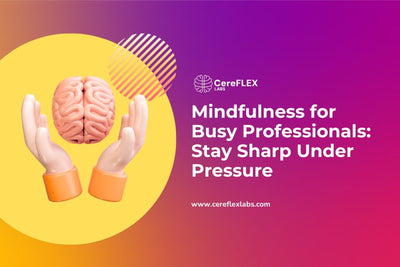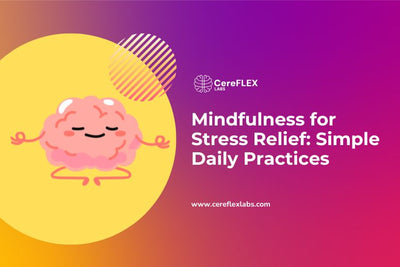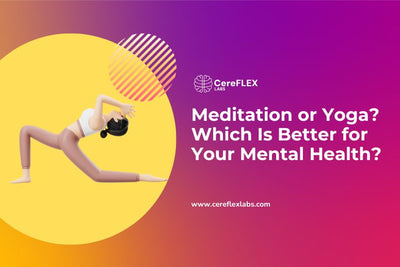As we age, concerns about memory loss and dementia naturally arise. Many people in their 40s and 50s begin considering ways to protect their brains from cognitive decline.
Nootropics, also known as "smart drugs" or "cognitive enhancers," have gained popularity for their potential to boost memory, sharpen focus, and support overall brain health. But can they truly help maintain cognitive function or reduce the risk of dementia? While research on nootropics continues, other lifestyle factors also play a crucial role in preventing dementia naturally.
This guide explores how nootropics work, the latest scientific insights into their effectiveness for dementia prevention, and the potential risks and benefits they pose.

What are nootropics?
Nootropics, often called "smart drugs" or "cognitive enhancers," are substances that improve brain function—particularly memory, focus, creativity, and motivation. They can be derived from natural sources (such as herbs and amino acids) or synthetically developed to influence brain chemistry and enhance cognitive performance.
Dr. Corneliu E. Giurgea, a Romanian psychologist, coined the term "nootropic" in 1972 to describe compounds that support cognitive functions like memory and learning, particularly in individuals experiencing cognitive decline.1 Unlike stimulants, nootropics typically provide neuroprotective benefits with fewer side effects.
These substances are widely used by students, professionals, and older adults seeking to maintain or enhance cognitive abilities.
What do nootropics do?
Nootropics support brain function in several ways, including:
- Enhancing cerebral blood flow, oxygenation, and glucose metabolism, ensuring that brain cells receive the energy they need.
- Protecting neurons from oxidative stress and damage, which may help slow cognitive decline.
- Boosting the production of essential brain proteins, aiding in neurogenesis and brain plasticity.
- Regulating the body's stress response, improving resilience to mental fatigue.
- Modulating neurotransmitter levels, such as acetylcholine and dopamine, which influence memory, focus, and mood.
Neurologists and psychiatrists sometimes prescribe nootropic medications for individuals with cognitive impairments, memory disorders, or learning disabilities, such as Alzheimer’s disease or traumatic brain injury. These medications often require weeks or months to produce noticeable improvements.
Many healthy individuals also use over-the-counter nootropic supplements to support memory, focus, and mental clarity. However, research on their effectiveness is still limited, and not all supplements are backed by strong scientific evidence. Consulting a doctor before use is advisable to ensure safety and appropriate usage.
Can nootropics prevent dementia?
Nootropics alone are not proven to significantly enhance cognitive function in individuals with dementia. However, when used alongside cholinesterase inhibitors (ChEIs)—medications that help preserve acetylcholine, a neurotransmitter essential for memory and learning—they may offer additional cognitive benefits.
This combination may help enhance brain activity, support neurogenesis, and improve blood flow in critical brain regions such as the frontal lobe, hippocampus, and striatum. These effects could contribute to slowing cognitive decline in individuals with mild to moderate dementia, but more research is needed to confirm long-term benefits.
Types of Nootropics Commonly Used for Cognitive Enhancement
A wide range of nootropics is used to enhance cognitive function. Some, like Ginkgo Biloba and Bacopa monnieri, are derived from plants, while others, such as racetams and modafinil, are synthetically developed to support brain function.
Here are a few of the most commonly studied and widely used nootropics:

Ginkgo Biloba
Ginkgo Biloba, derived from the ancient Ginkgo tree, is a widely used herbal supplement known for its potential to support cognitive function, memory, and circulation. It is believed to enhance focus and recall by increasing blood flow to the brain.2
How It Works
Ginkgo Biloba promotes brain health through several mechanisms:
-
Antioxidant Properties – Protects neurons from oxidative stress, helping to prevent age-related cognitive decline.
-
Enhanced Neurotransmission – Boosts the activity of serotonin, dopamine, and norepinephrine, supporting mood, memory, and mental clarity.
-
Improved Blood Flow – Expands blood vessels, increasing oxygen delivery to the brain and reducing platelet clumping, which may lower the risk of stroke.
-
Nerve Protection – Reduces amyloid-β accumulation, a hallmark of Alzheimer’s disease, supporting long-term brain health.
With its neuroprotective and circulation-boosting effects, Ginkgo Biloba is widely used to enhance memory, mood stability, and overall brain performance.3
Common uses: Memory enhancement, mood regulation, and circulation support.
Bacopa Monnieri
A staple of Ayurvedic medicine, Bacopa monnieri is highly regarded for its ability to support cognitive function, particularly memory retention and mental processing speed. Research suggests it benefits both healthy individuals and those experiencing cognitive decline.4
How It Works
Bacopa monnieri enhances brain function through multiple mechanisms:
-
Active Compounds (Bacosides A & B) – Increase acetylcholine levels, improving communication between neurons.
-
Neuroprotection – Reduces oxidative stress, maintains neuronal integrity, and inhibits β-amyloid plaque formation, which is linked to Alzheimer’s disease.
-
Mood and Stress Regulation – Supports GABA and serotonin balance, promoting stress resilience and enhancing both short- and long-term memory.
-
Mitochondrial Support – Boosts ATP production, providing brain cells with more energy and strengthening neuronal connections.
With its cognitive-enhancing and stress-reducing properties, Bacopa monnieri is widely used to support memory, mental clarity, and overall brain resilience.
Common uses: Memory enhancement, stress reduction, and cognitive clarity.
Panax Ginseng
Panax Ginseng, a widely used herbal remedy, is known for its ability to enhance energy levels, cognitive function, and mood stability. Traditionally used in Eastern medicine, it has gained popularity for its potential to boost memory, focus, and overall mental performance—particularly in individuals experiencing fatigue or stress.
How It Works
Panax Ginseng supports brain and body function through multiple mechanisms:
-
Adaptogen – Helps the body manage stress by balancing the nervous system and reducing mental and physical strain.
-
Fatigue Reduction – Enhances energy production, making it beneficial for those experiencing low stamina or mental exhaustion.
-
Cognitive Support – Improves memory, concentration, and mental clarity, particularly in aging adults and individuals under stress.
-
Physical Performance – Some studies suggest it may enhance physical endurance and stamina, though results vary among individuals.
-
Mood Regulation – Modulates dopamine and serotonin levels, which may help alleviate anxiety and mild depressive symptoms.
With its energizing and cognitive-enhancing properties, Panax Ginseng is widely used to promote mental clarity, memory support, and stress resilience.
Common uses: Mental clarity, memory enhancement, and stress reduction.

Rhodiola Rosea
Rhodiola Rosea, a well-known adaptogen, has been used in traditional medicine for centuries to combat stress and fatigue. Today, it is recognized for its ability to support mental clarity, memory, and physical endurance—especially in high-pressure situations.5
How It Works
Rhodiola Rosea benefits both mental and physical health through several mechanisms:
-
Stress Adaptation – Helps the body regulate stress hormones, improving resilience against mental and physical fatigue.
-
Cognitive Performance – Enhances memory, focus, and emotional stability, particularly during periods of high stress.
-
Mood Support – May reduce anxiety, depression, and emotional strain, helping to maintain mental clarity.
-
Physical Stamina – Some studies suggest it may boost energy levels and metabolic function, though more research is needed.
With its stress-reducing and cognitive-enhancing properties, Rhodiola Rosea is widely used to promote fatigue resistance, mental endurance, and overall well-being.
Common uses: Fatigue reduction, improved memory, and mental endurance.
Effectiveness of Nootropics in Preventing Dementia
While some nootropics may support cognitive function, there is no conclusive evidence that they can prevent neurodegenerative diseases like Alzheimer’s. However, certain compounds have been studied for their potential role in slowing cognitive decline.
Can Nootropics Prevent Alzheimer’s or Reduce Cognitive Decline?
Alzheimer’s disease (AD) is a progressive neurodegenerative disorder marked by memory loss and cognitive impairment due to the breakdown of neural cells. Although its exact cause remains unknown, research focuses on slowing its progression through different mechanisms, including neurogenesis, synaptic preservation, and inflammation control.
One promising area of study is neurogenesis, the formation of new neurons in the hippocampus. This process naturally declines with age and is further impaired in AD. Restoring neurogenesis—alongside reducing neuroinflammation and synaptic loss—may be key to slowing cognitive decline.
Preclinical studies suggest that certain nootropics, such as Ginkgo Biloba, may help support brain health and reduce amyloid plaque formation, a hallmark of AD. Its active component, EGb 761, has shown potential in enhancing memory, promoting neurogenesis, and improving brain plasticity in animal models.
However, while these findings are promising, human trials remain inconclusive. More rigorous research is needed to determine whether nootropics like Ginkgo Biloba can meaningfully reduce Alzheimer’s risk or slow cognitive decline in aging adults.
Risks and Side Effects of Nootropics
While nootropics may enhance cognitive function, they can also cause side effects, particularly in older adults. Seniors are often more susceptible to adverse reactions due to existing medical conditions or medication interactions. Therefore, careful consideration is essential when exploring nootropics for seniors. Consulting a healthcare professional is crucial.
Some individuals may experience the following side effects:
-
Headaches
-
Digestive issues (such as nausea or diarrhea)
-
Dizziness
-
Sleep disturbances (trouble sleeping or vivid dreams)
-
Increased anxiety or restlessness in sensitive individuals
Safety Concerns with Long-Term Use:
- Potential for dependence, which may reduce effectiveness over time
- Possible drug interactions, particularly with blood thinners, antidepressants, or medications for high blood pressure
- Risk of worsening pre-existing conditions, such as hypertension or diabetes
To reduce potential side effects, consider the following:
- Consult a healthcare provider before starting any new supplements, especially if you have underlying health conditions or take prescription medications.
- Weigh the potential cognitive benefits against the risks, particularly for older adults, who may be more affected by side effects.
Taking these precautions can help ensure safe and effective use of nootropics while minimizing health risks.
Comparison with Other Cognitive Health Strategies
While nootropics may enhance cognitive function, maintaining brain health requires more than supplements alone. Lifestyle factors such as exercise, diet, and mental stimulation play a crucial role in reducing the risk of cognitive decline and may be more effective long-term than relying solely on nootropics.
Exercise: Enhancing Brain Plasticity
Regular physical activity is one of the most effective ways to support brain function and memory retention. Exercise promotes blood flow to the brain, reduces inflammation, and stimulates the production of new neurons (neurogenesis).
A 2023 study found that moderate aerobic exercise and strength training significantly improved cognitive performance in older adults, particularly in areas related to memory, executive function, and mental processing speed.6
Diet: Fueling Brain Health
A nutrient-rich diet is essential for long-term cognitive function. Key dietary components include:
- Antioxidants (found in berries, dark chocolate, and leafy greens) – Combat oxidative stress, reducing brain cell damage.
- Omega-3 fatty acids (from fatty fish like salmon, walnuts, and flaxseeds) – Support neuronal structure and function.
- Polyphenols & Flavonoids (from green tea, turmeric, and cocoa) – Improve cognitive flexibility and memory.
A Mediterranean-style diet, rich in these nutrients, has been linked to a lower risk of dementia.
Mental Stimulation
Engaging in mentally stimulating activities helps strengthen neural connections and maintain cognitive function as you age. Activities such as:
- Reading, solving puzzles, or playing strategy games improve problem-solving and memory.
- Learning new skills or languages strengthens brain plasticity, helping the brain adapt to aging.
- Playing musical instruments has been linked to enhanced executive function and memory retention.
Unlike nootropics, which primarily enhance neurotransmitter activity and brain chemistry, these lifestyle-based strategies provide long-term structural and functional benefits to the brain.
While nootropics may offer short-term cognitive boosts, exercise, diet, and mental engagement have been consistently shown to reduce the risk of dementia and support lifelong brain health.
For the best results, combining nootropics with healthy lifestyle habits may be the most effective approach to preserving cognitive function and preventing decline.
Medications for Dementia vs. Nootropics
For managing cognitive decline and dementia, doctors commonly prescribe cholinesterase inhibitors such as Donepezil (Aricept) and Rivastigmine (Exelon). These medications work by increasing acetylcholine levels, a neurotransmitter essential for memory and learning, to temporarily slow cognitive decline in mild to moderate Alzheimer's disease.
However, these drugs do not cure dementia—they only help manage symptoms and may become less effective as the disease progresses.
Nootropics, on the other hand, are being explored for their potential to enhance brain function and support memory in the early stages of cognitive decline. While some compounds, such as Ginkgo Biloba and Bacopa monnieri, have shown neuroprotective properties, they lack the clinical validation and regulatory approval of prescription dementia medications.
While traditional dementia medications remain the primary treatment, nootropics may provide supplementary cognitive benefits—especially when combined with a healthy lifestyle and medical guidance. However, more research is needed to determine their role in preventing or managing dementia effectively.
Conclusion
Certain nootropics may support brain function, improve memory, and enhance mental clarity, though their effectiveness varies by individual and formulation. While they are not a cure for Alzheimer's or dementia, some may help support cognitive function and slow age-related decline, particularly in early cognitive changes.
However, nootropics work best alongside proven cognitive health strategies, such as regular exercise, a nutrient-rich diet, and mental stimulation. A holistic approach is essential for maintaining long-term brain health.
At CereFLEX Labs, we are committed to developing natural, research-backed cognitive health supplements. Our formulations use high-quality ingredients designed to support memory and cognitive resilience. Whether you want to enhance mental performance at work or support long-term brain function, our Brain Health Supplements can help.
Explore our carefully formulated, research-backed nootropics to find the best fit for your cognitive health needs. With CereFLEX Labs, you can take proactive steps toward better brain health with confidence.
